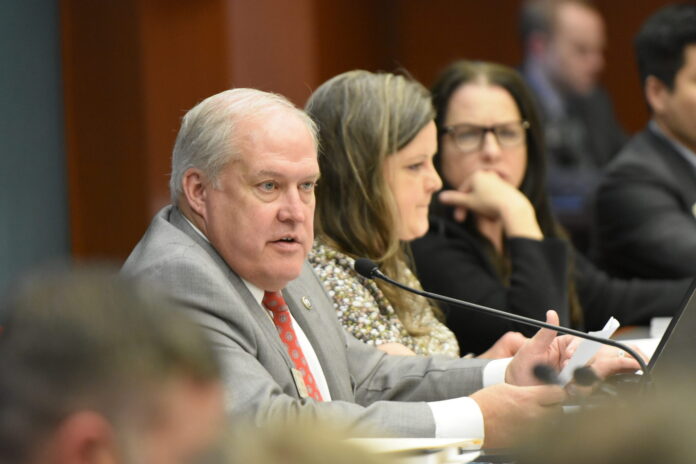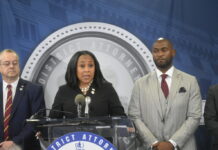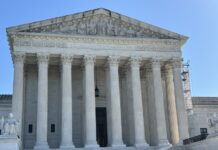
(Georgia Recorder) — A Georgia House committee is expected to vote Wednesday on whether to advance online sports betting legislation to the House Rules Committee, which would determine whether proposals to expand Georgia’s gambling industry makes it to the House floor before the 2024 session wraps up on Thursday.
On Monday, the House Higher Education Committee members spent an hour debating how sports gambling revenue should be spent on education in the event Georgia voters legalize sports betting at the ballot box in the November election.
Scheduled for Wednesday’s higher education agenda are Senate Bill 386, which establishes a framework for a sports gambling industry in Georgia, and Senate Resolution 579, which would set up a constitutional amendment referendum that gives voters the chance to sanction sports gambling in Georgia.
Democratic lawmakers suggested Monday that some of the profits from sports gambling be spent on free school lunches, historically Black colleges and universities, and other educational programs. Democratic committee members expressed support for restoring language that prioritized fully funding pre-K classes, which was included in the Senate legislation passed earlier in the session.
Watkinsville Republican Rep. Marcus Wiedower said he has always tried to be transparent while working the last 14 months on sports gambling measures. His latest proposal is to have the $100 million or more in projected yearly revenue distributed the same way as the state’s educational lottery program, which pays for HOPE college scholarships, pre-K education and capital improvements.
A proposed House committee amendment proposes to increase the tax revenue that the state will receive from sports gambling from 20% to 25%.
Wiedower said the extra revenue from sports betting should still trickle down to the state’s pre-K program. While there could be an endless number of good ideas from the 236 members of the General Assembly on how to spend sports gaming proceeds, Wiedower said he feels like he has to draw a line.
The amount of funding that HOPE and pre-K programs receive is determined by the state budget passed by the Legislature.
“I didn’t want to turn this into an Oprah affair and everyone gets a car and then what happens nobody really gets anything,” said Wiedower, who is carrying the sports betting legislation in the House.
Minority Whip Sam Park questioned why there was no funding allocated for needs-based higher education in the amendment resolution.
Lilburn Democratic Rep. Jasmine Clark has recommended that the committee add back language stating that all voluntary pre-K slots must be funded before any other education funds can be spent.
“There are a lot of people who get HOPE scholarships but HOPE is not open to everyone like pre-K,” Clark said. “There are a lot of constituents and families out there that would benefit from us fully funding pre-K.”
Higher Education Committee Chairman Chuck Martin said that the problem with mandating that pre-K be fully funded is its nebulous nature. HOPE scholarships were recently deemed to be fully funded while covering about 90% of tuition before Gov. Brian Kemp budgeted enough money to cover 100% of tuition for this current academic year, he said.
Martin said the lottery funds also include money to help students cover the financial gap needed to graduate college.
“It’s not as if we have $1.9 billion in the education fund and we’re only spending $10 million a year,” the Alpharetta Republican said. “It’s not a pool of money that exists out here in a vacuum.”
The sponsor of SR 579, Athens Republican Sen. Bill Cowsert, said he disagreed with no longer prioritizing pre-K and requiring that 80% of the state’s proceeds go to lottery-funded educational programs. The House substitute also removed setting aside 15% for gambling prevention and addiction and 5% to promote sporting events in Georgia.
The changes mean that the General Assembly will have to determine how much money is spent to treat problem gambling each year.
“They’re spending $400,000 a year out of $1.2 billion in (lottery) profits and there is nothing compelling the General Assembly in the future to dedicate any funding towards that,” Cowsert said.
Cowsert discussed the numerous versions of sports betting legislation that have failed to pass both chambers over the past few years, including plans to divide revenue in areas such as rural health care and needs-based scholarships. Pre-K was a preference for caucus leadership in both political parties this year, he said.
“I’m an advocate of needs-based funding,” Cowsert said. “I think it helps lift the entire state, but I’ve also said I’m not fighting over the exact details of where this money goes because I don’t think it’s a significant amount to move the needle on any subject matter.”
Wiedower said that he supports putting the fate of legalizing sports betting into the hands of several millions Georgia voters who’ll cast ballots in the presidential election this fall when participation should be high. The legislation will add guardrails to an online industry that’s already widely used in Georgia without the state reaping any of the profits like several dozen other states, Wiedower said.
“I cannot think of a better time to gauge the true interest in the state of Georgia than in a presidential election,” he said.
Cowsert expressed his desire for the House to pass the substitute sports betting legislation before the session ends on Thursday. For the constitutional referendum bill to pass, it would need the support of two-thirds of House members.
“Let’s keep the ball rolling, let’s see what the House does,” he said. “If the House even has an appetite for betting, then we can get in conference (committee) and agree, disagree or hammer it out. I think everyone needs to be flexible.”







